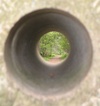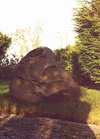B
| Bonnie Birken Tree |
|---|

Inscribed granite stone, Possibly made for Sir William Cuncliffe Brooks, Laird of Glentanar who |
| Brain Coral fossil Banff Castle |

An exceptionaly fine brain coral fossil placed on an octagonal plinth More Information |
C
| Carron River Falls |
|---|

Predominately a civil engineering project but its aesthetic pretensions may just make it eligible for inclusion. A system of weirs create a man made series of waterfalls with boulder built embankments. More Information |
D
| Dry lines , no fish stone |
|---|

A stone inscribed with the words: "Dry lines , no fish" and a cross like mark the inscription showing some trace of colour. Possibly by Sir William Cuncliffe Brooks, Laird of Glentanar who died in 1900. There are several other inscribed stones on the estate many at the sites of springs/wells. |
F
| Flower boat, Johnshaven |
|---|

A planting scheme and rockery utilising a yellow painted old boat. These rather kitsch planting schemes (and arrangements of creels, rocks, driftwood and etc.) still seem to abound in the north east, boats on the coast and wheelbarrows and farm carts inland. I rather worry how many once serviceable (and beautiful) traditional vehicles have been destroyed for this purpose for, to my taste, no aesthetic gain. More Information |
| Fraserburgh entrance, lighthouse models |

Large model lighthouses at the entrance to the town of the Banff and Strichen Roads surrounded by boulders and planting. More Information |
M
| Memsie Cairn |
|---|

A very well preserved example of a larger round cairn, with no turf covering. Once part of a whole landscape of cairns that have been removed. The information board mentions some of the finds listed below (info from RCAHMS) but at this date it seems unclear where exactly particular artefacts were excavated and how accurate the descriptions of them were. The overall impression however is of a large important sacred site dedicated to funery rites over an extensive period of time. More Information |
O
| Old Road, Bennachie Centre |
|---|

Carved words "THE TRAMPLING TO INVERURIE" and "THE TRUNDLING TO INSCH" on each side of a large granite stone next to the path just above the Bennachie Centre. In addition there is a hole drilled through the stone providing a sight line along the path. More Information |
P
| Part of Art, Space & Nature, at COAST festival 2010 |
|---|

Three circular assemblages of neatly arranged bundles of cut grass, on the lawn in front of the castle. More Information |
S
| Snakeswell Stone |
|---|

Carved granite marker with the fascinating wording: "The worm of the still is the deadliest snake on the hill" and a reference to whisky distilling that took place in this area of the and gave its name to a place called Snakeswell. Built by Sir William Cunliffe Brooks, Laird of Glentanar who died in 1900. |
| St Colms well |

Granite boulder marking the well, inscribed with the words "well beloved" and a cross in concentric circles. The well marks the boundary of the parish of Birse to the south. The laird of Glen Tanar Sir William Cuncliffe Brooks, Laird of Glen tanar who |
| Stone Placement |

An intentional relocation and placement of a natural stone for aesthetic reason. An act that draws on oriental (Zen) precedent as well as the examples of our neolithic forbears so noticeable in the local environment. More Information |
| Stonehaven Beach Waveform |

A dry garden of shingle, cut timbers and boulders, in a style derived at some distance from Japanese Zen dry gardens that seems to have become popular for public installations. More Information |
T
| The Gouk Stone, Bennachie |
|---|

The Goukstane ("Cuckoo stone"), which is signposted just off the walk to the summit. Is a large boulder. According to legend it is said to be visited by the first cuckoo to return to Bennachie after spending winter in Africa. Other people believe that this large stone was thrown down the hill by the mythical giant Jock O' Bennachie. |
This content was submitted by external contributors and does not necessarily reflect the views of the University of Aberdeen.
